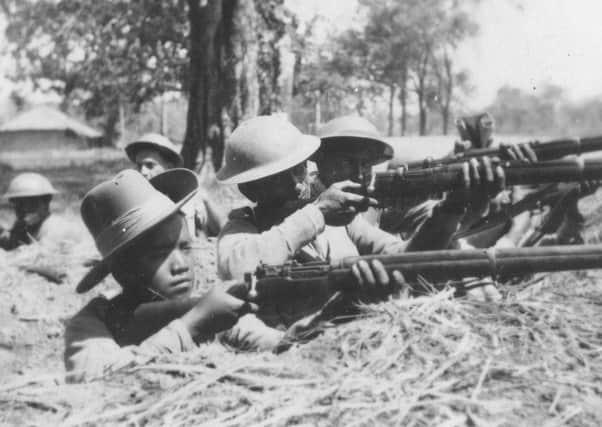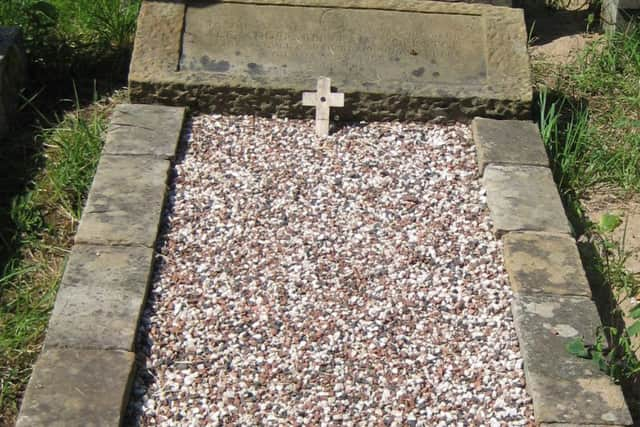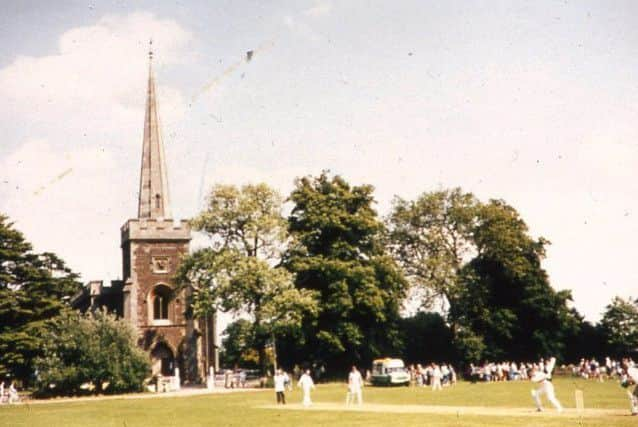Tribute to fallen Falkirk hero who fought to save India


Alexander Bertram Yorkston was 46 years old when he passed away as a result of the ultimately fatal wounds he received in the opening stages of the critical battle for Imphal in 1944.
However he died on British soil, as for reasons still unexplained he received treatment at the American Military Hospital in Frenchay, near Bristol - the only British national who seems to have died there.
Advertisement
Hide AdAdvertisement
Hide AdHis wife Helena provided his grave in the local churchyard there, with an inscription which includes the badge of his regiment - the Argyll and Sutherland Highlanders.


Concealed within these bare facts is an astonishing story of selfless courage from a man who had already fought in one world war, but who in middle age enlisted in his old regiment to serve in another.
Alexander originally joined the Argylls in 1916 and fought as a squaddie, then between the wars became a tea planter in India.
In 1939 he was back in Britain to marry Helena, two years his junior, and for a time seems to have run a newsagents shop in Brighton.
Advertisement
Hide AdAdvertisement
Hide AdHowever he soon re-enlisted in the Argylls, and - evidently seen as promising material - was listed as a Captain in the Middle East in 1942.


Then in 1943 he was seconded to the 10/1 Punjab Regiment of the Indian Army in Burma.
It is possible that his previous war record, and his later knowledge of the East (perhaps tea planting in somewhere like Assam, from where many Indian soldiers were drawn) made him seem a likely candidate for officer.
The Punjabi regiment was charged with defending the Imphal-Tiddim Road which formed the gateway to India.
Advertisement
Hide AdAdvertisement
Hide AdIt bore the brunt of a desperate attempt by Japanese forces to break through allied defences and inflict a decisive defeat on British and Commonwealth forces.
Had they succeeded in seizing the Imphal-Kohima line Indian communities would have felt the full brunt of the horrors meted out to people enslaved by the Japanese in conquered territories across Asia.
Thanks to the inspired leadership of Field Marshall Joseph Slim the Japanese, whose brutal progress through Burma was marked by relentless atrocity, were stopped in their tracks during months of bitter fighting and, lacking supplies, were first routed then completely annihalated as a fighting force.
Alexander was wounded on January 10, and passed away in the very different environment of Frenchay on May 22, where he was buried in the village churchyard four days later.
Advertisement
Hide AdAdvertisement
Hide AdThe Revd. Marcus Brown then the vicar of Frenchay, wrote the following in the June 1944 issue of the Parish magazine:
“Our churchyard, has recently supplied a ‘last resting place’ (on his way home) of one whose family home was in Scotland (Major Yorkston), and who, like so many others that are fighting on our behalf, received fatal injuries in Burmah.
“He reached ‘Home’ - the home of the Great Reunion - via Frenchay.
“As the firing-party gave the last salute over his grave we hoped it betokened not only the Army’s act of respect for one of its gallant officers, but also our own thankful regard for him, ‘at rest’ here in our midst, and all other valiant men, unknown to us, who have died for the cause of God and Freedom.”
Advertisement
Hide AdAdvertisement
Hide AdOn his gravestone the one-time private soldier is named a Major, which may have been a promotion (temporary or permanent) linked to his command in the Indian Army.
Although he never made it back to Falkirk, he has never been forgotten.
Villagers in Frenchay recently restored his grave, and on Wednesday a poppy wreath was placed there in tribute.